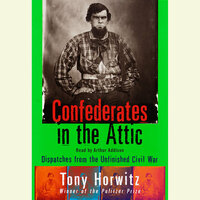You need to sign in or sign up before continuing.
Take a photo of a barcode or cover
informative
reflective
slow-paced
Very interesting look at the idea that portions of the South can't let go of the Civil War. Of course this is evident through news reports and other outlets which focus on stress and malcontent. The book goes deeper and has a more striking look at the emotions and reactions to the outcome than a typical review.
I really enjoyed the storytelling and the clean writing style. It had a Bill Bryson feel to it.
I really enjoyed the storytelling and the clean writing style. It had a Bill Bryson feel to it.
A fascinating and raw look into the world of Civil War reenacting and The South's complex history with racial tensions, politics, civil rights, and more. Equal parts entertaining, funny, shocking, maddening, sad, interesting, infuriating, etc. Although the occasional deep dive into Civil War facts / battles can become dull for a non-Civil War Buff like myself, it is still a great read and remains timely. Even though it was written in 1998, the complex perspectives and social conflicts that are discussed are still extremely relevant and troubling.
Compulsively readable. I wish Horowitz had a better grounding in historiography. That would have helped him understand that the stories people tell about the civil war are the stories that their 21st century perspective demands. That is why a war criminal like Wirz can become a martyr.
The complete ignorance -- and willful misunderstanding -- displayed by some subjects is stunning.
Best bits are the random facts about the war itself. It was the first US war that was photographed. Soldiers welcomed battles as a diversion from the monotony of marching. A prisoner at Andersonville weighed 180-something when he entered and 80-something when released.
The complete ignorance -- and willful misunderstanding -- displayed by some subjects is stunning.
Best bits are the random facts about the war itself. It was the first US war that was photographed. Soldiers welcomed battles as a diversion from the monotony of marching. A prisoner at Andersonville weighed 180-something when he entered and 80-something when released.
What started out as a report on civil war reenactors becomes a picture of race in America.
The dedication (?) page has a quote that sums up the book really well:
I don't think I could do better than that with a 2000 word review. Southerners (of which I'm kind of one) are very strange about that war, and it's scary.
"Southerners are very strange about that war."
-Shelby Foote
I don't think I could do better than that with a 2000 word review. Southerners (of which I'm kind of one) are very strange about that war, and it's scary.
"Confederates in the Attic: Dispatched from the Unfinished Civil War," by Tony Horowitz was a fascinating look at those who are passionate about preserving the history of the Civil War. It delves into southern poverty, race relations, and those obsessed with war reenacting. Written in the late 1990s it was dated in some areas regarding current events, but overall it was a solid read.
This book is making me proud to live in Virginia! Haha....or something....Laugh out loud funny, very informative...no boring history here! And goddamn I love those hardcore chickens!
I was told by a gentleman at a Civil War event I went to that if I read one book about the Civil War, it ought to be this one. And he was right. This is an incredible book, not so much for what it teaches about the Civil War, but for what it has to say about people and how they relate to their history, or don't.
The reporting is outstanding and very well organized. I learned a lot more about the Civil War than I'd ever learned in school. Reading this book 16 years after its initial publication was illuminating too. I don't know why the book cover emphasizes how funny the stories are supposed to be. Many of the observations were profoundly depressing. Overall I learned quite a bit for better or worse.


